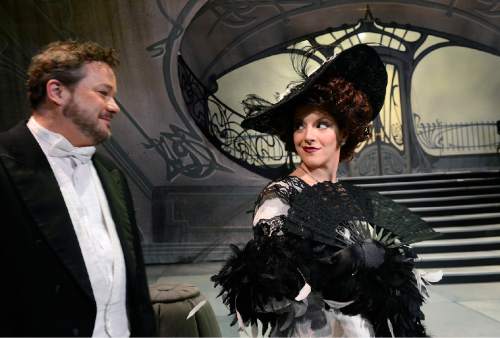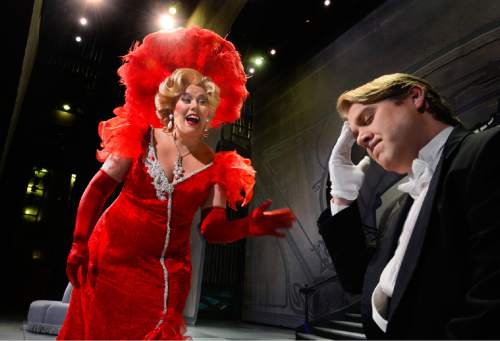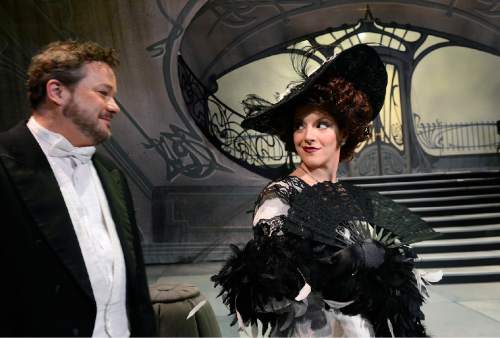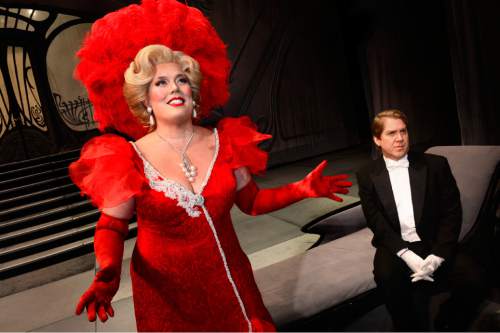This is an archived article that was published on sltrib.com in 2016, and information in the article may be outdated. It is provided only for personal research purposes and may not be reprinted.
Daniel Belcher dares you not to smile when you watch Utah Opera's production of "The Merry Widow."
"Everyone can sit back and have fun," the baritone said of Franz Lehár's effervescent operetta, which is sandwiched between two of the opera world's meatiest tragedies ("Tosca" and "Aida") on the current season.
The operetta, which opens Saturday, Jan. 16, at the Capitol Theatre, is a revival of the company's May 2000 production, with an eye-catching Art Deco-inspired set and lavish costumes constructed by Utah Opera.
"It's a fun, kind of complicated story," said stage director David Gately, who's returning for his 11th Utah Opera production. "It's incredibly light-hearted; there's no deep meaning."
Belcher, who's also a longtime Utah Opera favorite, portrays notorious bon vivant Danilo Danilovitch. Leaders of Danilo's poverty-stricken homeland, Pontevedro, see him as an ideal husband for the recently widowed Hanna Glawari, whose fortune they are desperate to keep in Pontevedro. The only problem is that Hanna and Danilo have a romantic history that didn't end well.
Baron Zeta, the ambassador, is particularly keen to get the two back together, but his wife, Valencienne, has another agenda: She wishes to break up with her boyfriend, Camille de Rosillon, and decides marrying him off to Hanna is the best way to accomplish this.
If the plot sounds convoluted, that's because it is. And, unlike grand opera, the operetta includes a lot of spoken dialogue alternating with the sung passages. Sounding natural while projecting your unamplified speaking voice to the back row of a 2,000-seat house is one of the operetta's special challenges. Pacing yourself while dancing and singing — again, without microphones — is another. But the singers and director said the challenges add to the fun.
" 'The Merry Widow' is hard," Gately said. "And it has to look effortless.
"You need to play it like this Ernst Lubitsch, '30s, fast-paced comedy," he said. "In a house with no mics, you can't keep that same rapid pace, but you need a sense of it being nonstop. It's like the Marx Brothers without the slapstick."
"Dialogue requires slightly different acting chops," Belcher said, "but the heart of opera is just storytelling."
Soprano Caroline Worra, who will be making her Utah Opera debut but playing Hanna for the fourth time, said she's especially pleased that the production will be performed in English. "I love singing in English; it's my favorite, actually," she said. "There's such an immediacy for the audience, and we're able to feel that onstage."
Jerry Steichen, who was principal pops conductor of the Utah Symphony for 12 seasons, returns to lead the orchestra in this production; former Utah Symphony | Utah Opera chorus master Susanne Sheston will prepare the Utah Opera Chorus. Like his colleagues, Steichen enjoys the operetta's balance of music, comedy and romance. Ultimately, though, it comes down to the tunes.
"You can't beat the tunes," he said. "I still cry every night directing [Hanna's aria] 'Vilja.' " —
Meet me at Maxim's
Utah Opera presents an English-language performance of Franz Lehár's "The Merry Widow."
Where • Capitol Theatre, 50 W. 200 South, Salt Lake City
When • Saturday, Jan. 16, 7:30 p.m.; evening performances continue Jan. 18, 20 and 22, with a 2 p.m. matinee Jan. 24
Tickets • $18-$89 ($5 more on performance day); utahopera.org
In a nutshell • Leaders of cash-strapped Pontevedro are keen to keep the wealthy widow Hanna Glawari in the country by finding her a Pontevedran husband, but will she and her former beau, playboy Danilo Danilovitch, cooperate?
Running time • About 3 hours, including two intermissions
Learn more • The company has posted background material at utahopera.org/onlinelearning and utahopera.org/15-16-season/the-merry-widow. In addition, principal coach Carol Anderson will give a lecture-demonstration an hour before each performance and artistic director Christopher McBeth will field questions after each performance; these events take place in the Capitol Room on the west side of the theater.









